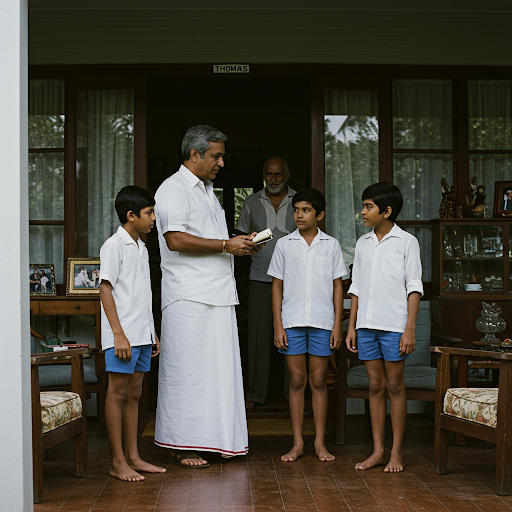The Visitors from Imbulgoda
The Visitors from Imbulgoda
The visitors from Imbulgoda arrived on a Sunday as if the afternoon heat had carried them to our doorstep. Two boys, rigid in white shirts and blue shorts, hovered behind their father like uneasy shadows. The man – grey threading his temples, his sarong starched to a sharpness that suggested careful preparation – spoke with the deliberate politeness of someone who had rehearsed his lines. His voice, smooth as aged teak, wove a fragile claim of kinship to my mother’s side of the family. A thread so faint, I wondered if it would snap under scrutiny.
I had never met them. Their names had never been uttered in our home. Yet here they stood, their smiles not quite settling into their eyes.
They became regular visitors after that. The father – Jayamanne – wielded his sons like credentials, presenting them as proof of something – perhaps legitimacy, perhaps obligation. The boys, village-bred and wide-eyed, seemed carved from a different world than mine. There was me, the college boy in pressed trousers from the private Christian school in Colombo, and then them, in their short trousers with sleeves buttoned tight at the wrists as if to contain their restlessness.
Jayamanne carried a small notebook and pencil in his shirt pocket, the tools of a man who dealt in accounts, in tallies. The older boy was thin, sharp-featured, with a face that might have been handsome if not for the wariness pinching it.
Thomas, my father, and ever the host, gestured for them to sit on the verandah’s armchairs, their hands gripping the edges as if unsure of the courtesy that was meant for them. “Susan,” he called my mother, his voice casual, “bring some tea, no?”
The boys’ eyes flickered past the drawing room doors, tracing the framed photographs on the walls, the lace curtains, the curios in the cabinet – each object weighed, measured, filed away in some silent calculation.
Only after the third or fourth visit did Jayamanne reveal the true nature of his pilgrimage to our home. The notebook in his pocket was not just for show. He had come about a loan – ten thousand rupees, to take out for a bus – back when my father was still soft enough to believe in the sanctity of a handshake. The repayment had been delayed, then forgotten, until Jayamanne’s presence had become a quiet accusation at our doorstep.
My father’s disappointment was slow and heavy. He had expected better from a man who invoked family ties so freely. But Jayamanne, with his rehearsed humility and sons in tow, was a man who knew the weight of patience. Finally, the repayments came after much persuasion—small, grudging sums that arrived like apologies, each eroding my father’s faith a little more.
And still, they kept visiting. The boys grew taller, their shirts straining at the seams, while Jayamanne’s notebook shrank thinner, its pages peeled away like layers of debt that could never quite be settled.

Comments
Post a Comment